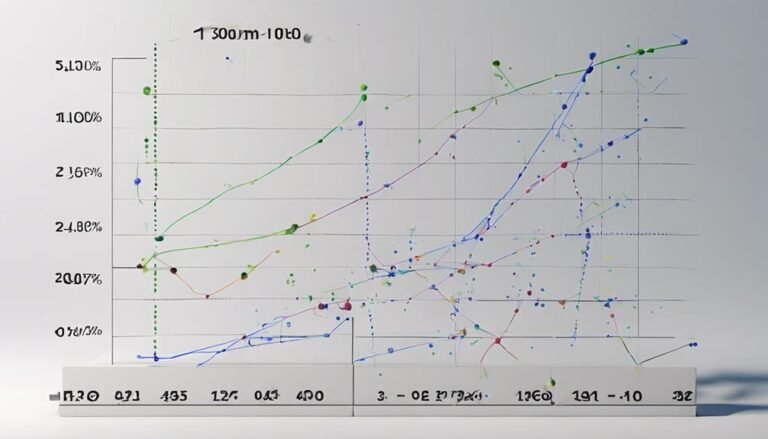Closing Costs: What They Are and How Much They Cost
Closing costs encompass additional expenses in real estate transactions, impacting both buyers and sellers. Buyers typically pay 3% to 6% of the property price. Various factors influence these costs, including location, property value, and negotiation power. In 2021, average closing costs were $6,905, with variations by region. Common costs include application fees, attorney fees, and title insurance. Proactive negotiations, exploring financing options, and reviewing charges can help manage expenses. Understanding these components is essential for a successful transaction.
Key Takeaways
- Closing costs are additional expenses in property transactions.
- Buyers typically pay 3% to 6% of the purchase price.
- Average closing costs in 2021 were $6,905, varying by location.
- Negotiating, cost-saving strategies, and seller contributions can reduce costs.
- Factors like location, property value, and market conditions influence closing costs.
Definition and Examples of Closing Costs
In the domain of real estate transactions, closing costs refer to the additional expenses incurred beyond the property price, encompassing a range of fees and charges essential for the completion of the deal. These costs can have a significant impact on the budget of both buyers and sellers.
Buyers typically pay between 3% to 6% of the purchase price in closing costs, with the average in 2021 being $6,905, including transfer taxes. To mitigate these expenses, cost-saving strategies can be employed.
Buyers have the option to negotiate with sellers to share the burden of closing costs. Additionally, comparing fees among lenders, closing at month-end to reduce prepaid interest charges, and questioning excessive fees for reduction are effective ways to manage and potentially lower closing costs.
Factors Influencing Closing Costs
Factors that can influence closing costs in real estate transactions encompass a variety of vital elements that play a pivotal role in determining the overall financial obligations associated with finalizing a property deal.
The location impact is a significant factor, as closing costs can vary based on state regulations, local taxes, and fees. Property value considerations also play an essential role, as higher-priced properties may incur higher closing costs due to percentage-based fees.
Additionally, market conditions and the negotiation power of the buyer or seller can impact closing costs. By understanding these factors and seeking to mitigate expenses where possible, individuals involved in real estate transactions can better prepare for the financial aspects of closing a deal.
Average Closing Costs in 2021
The financial commitments associated with finalizing a real estate transaction in 2021 are heavily influenced by the average closing costs incurred during this period. In 2021, the average closing costs were $6,905 with transfer taxes included.
However, it is important to note that these costs can vary greatly depending on the location due to regional variations. For instance, the District of Columbia saw the highest closing costs at 3.9% of the property purchase price.
To mitigate these expenses, buyers can employ cost-saving strategies such as negotiating with sellers to share the burden of closing costs. Understanding these regional disparities and implementing effective negotiation tactics can lead to substantial savings for individuals navigating the real estate market in 2021.
Breakdown of Common Closing Costs
An in-depth analysis of common closing costs in real estate transactions reveals the intricate financial components involved in finalizing property purchases or sales. When breaking down closing costs, various expenses come into play. These include application fees, attorney fees, closing fees, and courier fees.
Additionally, escrow deposits, homeowners insurance, and title insurance contribute to the overall cost. Other common charges consist of origination fees, pest inspections, property appraisal fees, recording fees, survey fees, and transfer taxes. Underwriting fees, which may encompass FHA mortgage insurance, are also part of the closing cost breakdown.
Negotiating and Managing Closing Costs
Initiate proactive negotiations to strategically manage and potentially reduce the closing costs associated with real estate transactions. Cost-saving strategies and negotiation tactics can be employed to mitigate financial burdens.
Buyers should explore financing options and consider requesting a seller contribution towards closing costs. Thoroughly reviewing the itemized list of charges, such as application fees, attorney fees, and recording fees, can reveal areas for potential negotiation. By comparing fees among lenders and leveraging available information, buyers can make informed decisions to optimize cost management.
Additionally, coordinating the closing date towards the end of the month may reduce prepaid interest charges. Collaborating with sellers to lower the purchase price or negotiate cost-sharing arrangements can lead to a more financially advantageous transaction.
Conclusion
To sum up, maneuvering through the world of closing costs in real estate transactions demands a sharp understanding of the various components, factors, and negotiation tactics involved.
By carefully analyzing the breakdown of common closing costs and leveraging strategies to manage and reduce expenses, both buyers and sellers can guarantee a smoother and more financially prudent closing process.
The intricacies of closing costs underscore the importance of meticulous planning and strategic decision-making in real estate transactions.







